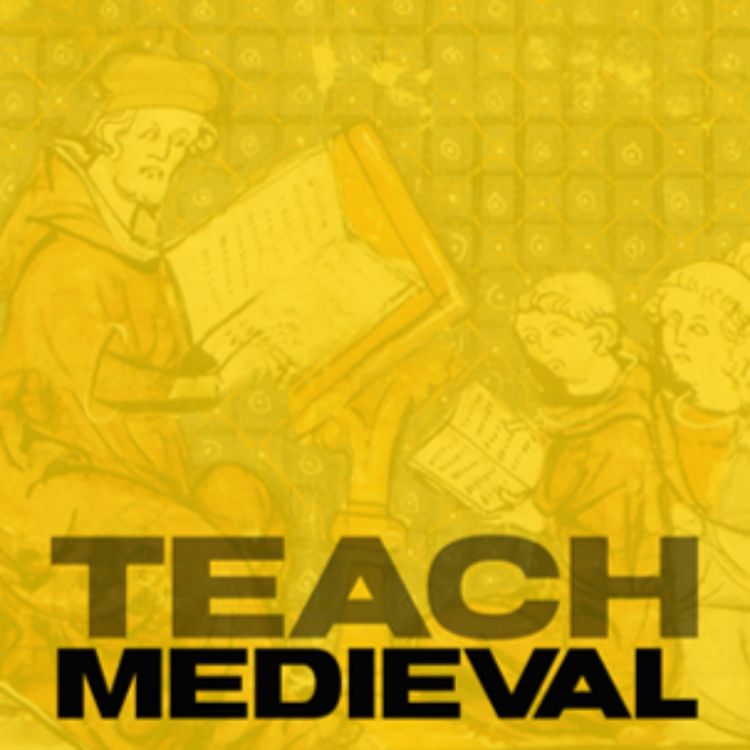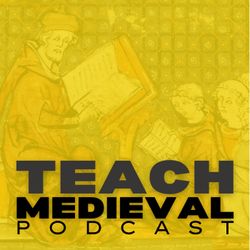Share

Teach Medieval
Why did Urban II call the First Crusade? (Ep.3: Religious conviction)
On 27th November 1095, at a great council he had summoned at Clermont in France, Pope Urban II preached the First Crusade. His motives for doing so have been much debated ever since. In this episode, Associate Professor Nicholas Morton (Nottingham Trent University) explores the role played by Urban’s own religious conviction. Was it the main reason Urban called his crusade?
This episode is the third in a mini-series of three. The complete mini-series includes:
Ep.1: What role did the appeal from Alexios I play?
Ep.2: What role did political ambition play?
Ep.3: What role did religious conviction play?
Recommended works by Associate Professor Nicholas Morton:
Encountering Islam on the First Crusade
The Crusader States and their Neighbours: A military history 1099-1187
The Field of Blood: The Battle for Aleppo and the Remaking of the Medieval Near East
The Mongol Storm: Making and Breaking Empires in the Medieval Near East
Further reading:
Andrew Jotischky: Crusading and the Crusader States (2nd Ed.)
Jonathan Phillips: The Crusades 1095-1204
Jonathan Riley-Smith: The Crusades: A History
If you would like to keep up to date with all things ‘Teach Medieval’, you can find us on:
Twitter: @TeachMedieval
Instagram: @teachmedieval
Facebook: Teach Medieval
Music by Aroshanti.
More episodes
View all episodes

Why did the Second Crusade fail? (Ep.2: Analysis)
29:44|Step into one of the most dramatic and disastrous chapters of medieval history with our brand-new two-part podcast series on the Second Crusade. In Episode 1, we plunge into the story itself—from the shocking fall of Edessa in 1144 and the rallying cry across Europe to the march eastward of kings and humiliating defeat at the gates of Damascus. Then, in Episode 2, we go deeper, asking the big question: why did the Second Crusade fail so completely? Was it poor leadership, Byzantine hostility, or the growing unity of Muslim forces? Guiding us through this fascinating mix of ambition, betrayal, and miscalculation is Associate Professor Nicholas Morton of Nottingham Trent University, a leading expert in crusader history. If you want gripping storytelling, sharp analysis and expert insight, this is a series you won’t want to miss. The Second Crusade like you’ve never heard it before!This episode is part of a mini-series:Ep.1: Narrative - What's the story of the Second Crusade?Ep.2: Analysis - Why did the Second Crusade fail?Recommended works by Associate Professor Nicholas Morton:The Field of Blood: The Battle for Aleppo and the Remaking of the Medieval Middle EastThe Crusader States and their Neighbours: A military history 1099-1187Encountering Islam on the First CrusadeThe Mongol Storm: Making and Breaking Empires in the Medieval Near East Further reading:Andrew Jotischky: Crusading and the Crusader States (2nd Ed.)Jonathan Phillips: The Crusades 1095-1204Jonathan Riley-Smith: The Crusades: A History If you would like to keep up to date with all things ‘Teach Medieval’, you can find us on:Instagram: @teachmedievalTwitter: @TeachMedievalThreads: Teach MedievalFacebook: Teach MedievalLinkedIn: Teach Medieval Main theme by Aroshanti
Why did the Second Crusade fail? (Ep.1: Narrative)
21:42|Step into one of the most dramatic and disastrous chapters of medieval history with our brand-new two-part podcast series on the Second Crusade. In Episode 1, we plunge into the story itself—from the shocking fall of Edessa in 1144 and the rallying cry across Europe to the march eastward of kings and humiliating defeat at the gates of Damascus. Then, in Episode 2, we go deeper, asking the big question: why did the Second Crusade fail so completely? Was it poor leadership, Byzantine hostility, or the growing unity of Muslim forces? Guiding us through this fascinating mix of ambition, betrayal, and miscalculation is Associate Professor Nicholas Morton of Nottingham Trent University, a leading expert in crusader history. If you want gripping storytelling, sharp analysis and expert insight, this is a series you won’t want to miss. The Second Crusade like you’ve never heard it before!This episode is part of a mini-series:Ep.1: Narrative - What's the story of the Second crusade?ep.2: Analysis - Why did the Second Crusade fail?Recommended works by Associate Professor Nicholas Morton:The Field of Blood: The Battle for Aleppo and the Remaking of the Medieval Middle EastThe Crusader States and their Neighbours: A military history 1099-1187Encountering Islam on the First CrusadeThe Mongol Storm: Making and Breaking Empires in the Medieval Near East Further reading:Andrew Jotischky: Crusading and the Crusader States (2nd Ed.)Jonathan Phillips: The Crusades 1095-1204Jonathan Riley-Smith: The Crusades: A History If you would like to keep up to date with all things ‘Teach Medieval’, you can find us on:Instagram: @teachmedievalTwitter: @TeachMedievalThreads: Teach MedievalFacebook: Teach MedievalLinkedIn: Teach Medieval Music by Aroshanti
What was the early Islamic response to the crusades? (Ep.2: Later unity)
50:26|The early Islamic response to the First Crusade was deeply disunited, with rivalry, distrust and self-interest undermining all hope of any real cooperation. This lack of unity was a major factor in the Crusaders’ remarkable success, allowing them to seize territory and establish the states of Outremer. In this new mini-series, Dr Thomas Brosset explores the nature and extent of this early disunity before turning to the emergence of key leaders who, in time, managed to coordinate a stronger, more muscular response to the Frankish presence in the Near East.This episode is one of a two-part mini-series:Ep.1: How disunited was the response in the early decades?Ep.2: How and when did unity begin to emerge?This mini-series was part-inspired by:The First Crusade and the Failure of Kerbogha’s Campaign from Mosul to Antioch (March–June 1098): A Re-evaluationDr Thomas Brosset refers to this work in 'Ep.1: Disunity':Nicholas Morton: The Field of Blood: The Battle for Aleppo and the Making of the Medieval Middle EastFurther reading:Andrew Jotischky: Crusading and the Crusader States (2nd Ed.)Jonathan Phillips: The Crusades 1095-1204Jonathan Riley-Smith: The Crusades: A History (4th Ed.) Social media:InstagramX (Twitter)ThreadsFacebookLinkedInMain theme by Aroshanti
What was the early Islamic response to the crusades? (Ep.1: Early disunity)
36:48|The early Islamic response to the First Crusade was deeply disunited, with rivalry, distrust and self-interest undermining al hope of any real cooperation. This lack of unity was a major factor in the Crusaders’ remarkable success, allowing them to seize territory and establish the states of Outremer. In this new mini-series, Dr Thomas Brosset explores the nature and extent of this early disunity before turning to the emergence of key leaders who, in time, managed to coordinate a stronger, more muscular response to the Frankish presence in the Near East.This episode is one of a two-part mini-series:Ep.1: How disunited was the response in the early decades?Ep.2: How and when did unity begin to emerge?This mini-series was part-inspired by:The First Crusade and the Failure of Kerbogha’s Campaign from Mosul to Antioch (March–June 1098): A Re-evaluationDr Thomas Brosset refers to this work in 'Ep.1: Disunity':Nicholas Morton: The Field of Blood: The Battle for Aleppo and the Making of the Medieval Middle EastFurther reading:Andrew Jotischky: Crusading and the Crusader States (2nd Ed.)Jonathan Phillips: The Crusades 1095-1204Jonathan Riley-Smith: The Crusades: A History (4th Ed.) Social media:InstagramX (Twitter)ThreadsFacebookLinkedInMain theme by Aroshanti
Who were the real Assassins and Templars? (Ep.3: Parallels)
32:45|The Assassins and Templars are two of the most iconic and enigmatic groups associated with the medieval Near East to the point where, even today, myths continue to swirl around their very names and huge entertainment franchises such as Ubisoft's 'Assassin's Creed' are founded on their legacy. But behind the (admittedly thrilling) fantasy, what's the reality? What part did these two groups play in what Dr Steve Tibble has called "the crazy, bloody world of the medieval Near East"?This episode is one of a three-part mini-series:Ep.1: Who were the real Assassins?Ep.2: Who were the real Templars?Ep.3: What parallels can we see between them?This mini-series is based on:Assassins and Templars: A Battle in Myth and BloodOther recommended works by Dr Steve Tibble:Templars: The Knights who made BritainCrusader Criminals: The Knights who went Rogue in the Holy LandThe Crusader StrategyThe Crusader ArmiesFurther reading:Andrew Jotischky: Crusading and the Crusader States (2nd Ed.)Jonathan Phillips: The Crusades 1095-1204Jonathan Riley-Smith: The Crusades: A History (4th Ed.) Social media:InstagramX (Twitter)ThreadsFacebookLinkedInMain theme by Aroshanti
Who were the real Assassins and Templars? (Ep.2: Templars)
30:06|The Assassins and Templars are two of the most iconic and enigmatic groups associated with the medieval Near East to the point where, even today, myths continue to swirl around their very names and huge entertainment franchises such as Ubisoft's 'Assassin's Creed' are founded on their legacy. But behind the (admittedly thrilling) fantasy, what's the reality? What part did these two groups play in what Dr Steve Tibble has called "the crazy, bloody world of the medieval Near East"?This episode is one of a three-part mini-series:Ep.1: Who were the real Assassins?Ep.2: Who were the real Templars?Ep.3: What parallels can we see between them?This mini-series is based on:Assassins and Templars: A Battle in Myth and BloodOther recommended works by Dr Steve Tibble:Templars: The Knights who made BritainCrusader Criminals: The Knights who went Rogue in the Holy LandThe Crusader StrategyThe Crusader ArmiesFurther reading:Andrew Jotischky: Crusading and the Crusader States (2nd Ed.)Jonathan Phillips: The Crusades 1095-1204Jonathan Riley-Smith: The Crusades: A History (4th Ed.) Social media:InstagramX (Twitter)ThreadsFacebookLinkedInMain theme by Aroshanti
Who were the real Assassins and Templars? (Ep.1: Assassins)
35:01|The Assassins and Templars are two of the most iconic and enigmatic groups associated with the medieval Near East to the point where, even today, myths continue to swirl around their very names and huge entertainment franchises such as Ubisoft's 'Assassin's Creed' are founded on their legacy. But behind the (admittedly thrilling) fantasy, what's the reality? What part did these two groups play in what Dr Steve Tibble has called "the crazy, bloody world of the medieval Near East"?This episode is one of a three-part mini-series:Ep.1: Who were the real Assassins?Ep.2: Who were the real Templars?Ep.3: What parallels can we see between them?This mini-series is based on:Assassins and Templars: A Battle in Myth and BloodOther recommended works by Dr Steve Tibble:Templars: The Knights who made BritainCrusader Criminals: The Knights who went Rogue in the Holy LandThe Crusader StrategyThe Crusader ArmiesFurther reading:Andrew Jotischky: Crusading and the Crusader States (2nd Ed.)Jonathan Phillips: The Crusades 1095-1204Jonathan Riley-Smith: The Crusades: A History (4th Ed.) Social media:InstagramX (Twitter)ThreadsFacebookLinkedInMain theme by Aroshanti
What was the Second Barons' War? (Ep.3: Significance)
21:51|It is over 750 years since Simon de Montfort called his 1265 parliament. Is his failed revolution still worth talking about today? Did it even matter at the time?This episode part of a mini-series:Ep.1: What were the causes of the Second Barons' War?Ep.2: What were the events of the Second Barons' War?Ep.3: What is the significance of the Second Barons' War?This mini-series is based on:The Song of Simon de Montfort: England's First Revolutionary and the Death of ChivalryFurther reading:Adrian Jobson (ed.): Baronial Reform and Revolution in England 1258-67David Carpenter: Henry III: The Rise to Power and Personal Rule, 1207-1258David Carpenter: Henry III: Reform, Rebellion, Civil War, Settlement, 1258-1272If you would like to keep up to date with all things ‘Teach Medieval’, you can find us on:Instagram: @teachmedievalTwitter: @TeachMedievalThreads: Teach MedievalFacebook: Teach MedievalLinkedIn: Teach Medieval Music by Aroshanti
What was the Second Barons' War? (Ep.2: Events)
30:55|From 1264 to 1267, Henry III of England was at war with many of his barons. What form did this conflict take? And how, ultimately, did it end?This episode part of a mini-series:Ep.1: What were the causes of the Second Barons' War?Ep.2: What were the events of the Second Barons' War?Ep.3: What is the significance of the Second Barons' War?This mini-series is based on:The Song of Simon de Montfort: England's First Revolutionary and the Death of ChivalryFurther reading:Adrian Jobson (ed.): Baronial Reform and Revolution in England 1258-67David Carpenter: Henry III: The Rise to Power and Personal Rule, 1207-1258David Carpenter: Henry III: Reform, Rebellion, Civil War, Settlement, 1258-1272If you would like to keep up to date with all things ‘Teach Medieval’, you can find us on:Instagram: @teachmedievalTwitter: @TeachMedievalThreads: Teach MedievalFacebook: Teach MedievalLinkedIn: Teach Medieval Music by Aroshanti